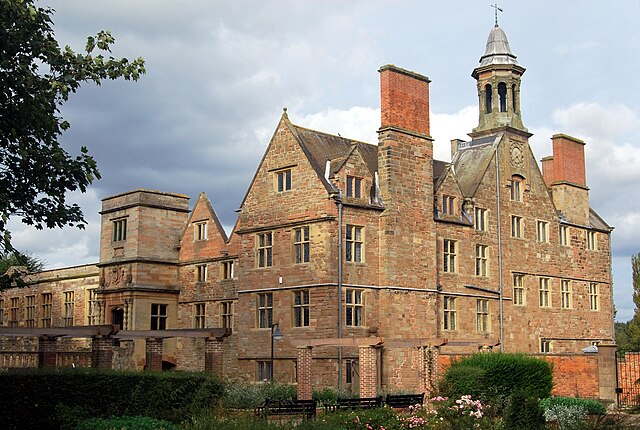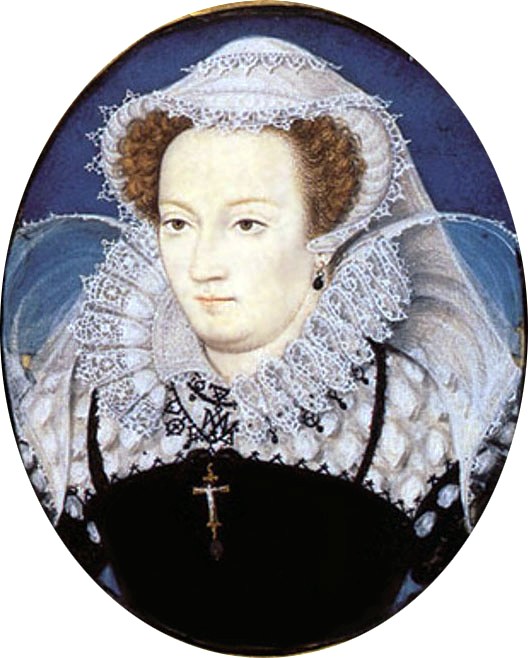 |
| Margaret Douglas, Countess of Lennox |
An Illicit Wedding
Arbella Stuart was born in 1575, the only child of Charles Stuart, Earl of Lennox and Elizabeth Cavendish. Her parents’ hasty marriage had
incurred the displeasure of the queen; Elizabeth, who liked to keep tight control on
the dynastic ambitions of her close relatives.
Charles’
elder brother Henry, Lord Darnley had married Mary Queen of Scots in 1565, only to be murdered in 1567. Both events angered the English queen, who was
discommoded to find herself jailer of Mary, who fled to England in 1568. The
Stuart-Cavendish marriage looked to be part of a deep laid plot to rescue Mary.
The bride’s stepfather Lord Shrewsbury, had the former queen in his care.
The marriage
seems to have been planned by Arbella’s grandmothers, Bess of Hardwick, Countess of Shrewsbury and Margaret Douglas, Countess of Lennox, who jointly chaperoned a meeting
between Elizabeth and Charles at Rufford Abbey[i], a property owned by Lord Shrewsbury.
Bess’s husband, Lord Shrewsbury wrote to Lord Burghley that the young couple;
‘Hath so tied themselves upon
[their] own liking as they can not part. The young man I so far in love as
belike he is sick without her.’[ii]
 |
| Rufford Abbey |
He wrote to
the queen too and Lady Lennox also wrote to Burghley. The marriage took place at
Rufford, within days of the couple’s first meeting in the late summer of 1574;
as both grandmothers well knew Elizabeth would have been very unlikely to
approve such a marriage. For her part in promoting the marriage Lady Lennox was
incarcerated in the Tower for a short period.
The Young Arbella
Arbella’s
date of birth was not recorded, perhaps surprising in one who, on her father’s
side was the only cousin of James, king of Scotland and also descended from Henry VII of England. She was certainly born
by 10th November when Lady Lennox replied to a letter from Mary
Queen of Scots, the correspondence was intercepted by the Elizabethan spy
service[iii]. Both Lady Lennox and
her daughter-in-law sent their good wishes to the incarcerated queen. The birth
took place at Chatsworth and Elizabeth’s step-brother Gilbert and his wife Mary[iv] were Arbella’s godparents.
 |
| Mary Queen of Scots in captivitiy |
In early April
1576 Charles Stuart died in Hackney and Lady Lennox insisted that Arbella was
heir to the Lennox estates in Scotland. The Regent for the young king, the Earl of Morton, dismissed these claims, saying the
properties now belonged to King James. Elizabeth did not support Arbella’s
claim, but Mary was persuaded to write an unsigned will granting;
‘To my niece Arbella, the
Earldom of Lennox held by her late father; and enjoin my son, as my heir and
successor to obey my will in this particular.’[v]
As in so many
matters, James did not fulfil his mother’s wish in this case[vi].
Until she was about three years old Arbella
lived with Lady Lennox and her mother at Hackney. The Lennox’s had no real
income, their lands having been given away and records show payments from Lady
Lennox to Bess, possibly on a loan. Elizabeth’s dowry of £3,000[vii] had not been paid at the
time of the sudden marriage as Lord Shrewsbury had been short of cash.
A Move North
 |
| The young Arbella |
‘Give ear to those who
affirmed that the Lady Arbella daughter to Charles’ the king’s uncle and born
in England, was next heir to the lands in England.’[viii]
It was Bess
who persuaded Elizabeth to pay the young Elizabeth Lennox a pension of £400[ix] per annum and £200[x] per annum for Arbella.
Bess then took her daughter and granddaughter to stay at Chatsworth;
‘I came hither of
Crestoline’s eve and left my little Arbell at Chatsworth. She endured very well
with travel.’[xi]
Christmas
1581 brought another change for the young child; her mother Elizabeth fell ill
during the Twelfth Night celebrations and died on 21st
January, leaving the six year old Arbella to Bess’s care. Bess was not pleased
when the title of Earl of Lennox was bestowed on Esmé Stuart by Arbella’s doting cousin.
Marital Dissension
 |
| Earl of Shrewsbury |
The
Shrewsbury marriage was starting to unravel; Lord Shrewsbury may have been
jealous of the fact that Arbella slept in her grandmother’s bedchamber. He
certainly threw her out of Gilbert Talbot’s house in Sheffield at one point
while Mary Talbot was pregnant.
The custodianship
of the exiled queen Mary was causing a breach between the couple that never
really healed. Bess was jealous of Mary, who had come to dislike the wife of
her jailer; Shrewsbury would side with Mary against Bess in public. Shrewsbury
also humiliated Bess in front of the servants.
It also cost
Shrewsbury money that he did not have as he was busy building a rival to his
wife’s Chatsworth at Worksop. Paying for Mary’s wines, spices and fuel cost
Shrewsbury £1,000[xii]
a year and loss of plate, buying pewter and other household items cost him
another £1,000 per annum.
In the
summer of 1590 the sick man told a servant that;
With almost tears in his
eyes that he feared the Lady Arbella would bring much trouble in his house by
his wife’s and her daughter’s [Mary Talbot] devices.’[xiii]
Ambitious Bess
 |
| Robert Dudley |
In March
1584 the eight year old Arbella was betrothed to the two year old son of the
queen’s favourite, Robert Dudley. Leicester probably hoped to see his son on
the throne as Elizabeth’s heir; but neither party dared inform the queen of the
engagement, well aware of her likely response. In the event neither Elizabeth
nor Mary Queen of Scots was amused. Mary writing;
‘Nothing has ever alienated
the Countess of Shrewsbury from me more than this imaginary hope……of setting
the crown on the head of Arbella, her granddaughter, by means of marrying her
to the son of the Earl of Leicester.’[xiv]
The plans
were to come to naught; Lord Denbigh died of a convulsion in July, aged three.
By this time
the Shrewsbury marriage was in pieces; Lord Shrewsbury even took to attacking
Bess’s children by her previous marriages and demanded control of the
properties she had brought to the marriage and he had ceded back to Bess. Bess
was not one to sit back and allow a man to walk all over her, even one as
powerful as Shrewsbury.
Mishaps at Court
.jpg/381px-William_Cecil,_1st_Baron_Burghley_from_NPG_(2).jpg) |
| Lord Burghley |
In the
summer of1587 Elizabeth finally invited the eleven year old Arbella to court.
Arbella went with Gilbert and Mary Talbot, who had Sir Charles Cavendish[xv] staying with them. Arbella made her
curtsey at court at Theobalds, the Lord Burghley’s country house where the court was
currently staying. Arbella spoke twice to the queen, as Charles advised his
mother in letters[xvi].
Arbella
dined in the queen’s presence several times. On one occasion Sir Walter Ralegh was present at dinner; Arbella was highly recommended to him
by Burghley;
‘He spoke openly and
directed his speech to Sir Walter Ralegh greatly in her commendation in that
she had the French, the Italian, played of instruments, danced, wrought[xvii],
and wrote very fair.’[xviii]
 |
| The Palace at Greenwich |
In June 1588
Arbella was once more summonsed to court at Greenwich; she was
again with Gilbert and Mary. But on this visit Arbella was betrayed by her
arrogance; in the words of the Venetian ambassador Arbella;
‘Displayed such haughtiness
that she soon began to claim first place; and one day on going in to chapel she
herself took such precedence of all the princesses who were in Her majesty’s
suite; nor would she retire, though repeatedly told to do so by the master of
ceremonies.’[xix].
Elizabeth
was deeply involved in the planning to repel the imminent invasion from Spain
and can only have been exasperated by the idiotic stance of the thirteen year
old girl. Arbella was supported by the young Robert Deveraux, Earl of Essex.
With the Armada bearing down on England, Arbella, a valuable pawn, was sent back to live
with Bess. By now the young teenager had come to hate her grandmother, often
abusing her;
‘In despiteful and
disgraceful words……….which she [Bess] could not endure.’[xx]
Bibliography
King James –
Antonia Fraser, BCA 1974
Arbella –
Sarah Gristwood, Bantam 2004
Robert Cecil
– Alan Haynes, Peter Owen Publishers 1989
Bess of
Hardwick – Mary S Lovell, Abacus 2006
The Letters
of Lady Arbella Stuart – Sara Jayne Steen ed, Oxford University Press 1994
Mary, Queen
of Scots – Alison Weir, BCA 2003
www.wikipedia.en
[ii]
Arbella - Gristwood
[iv]
Who was Elizabeth’s sister
[v]
Bess of Hardwick - Lovell
[vi]
Mary had previously left the earldom to Charles, which was given by James to
the Robert
Lennox, Bishop of Caithness in May 1578 and then passed on to Esmé
Stuart
[vii]
In 2011
the relative: historic standard of living
value of that income or wealth is £686,100.00
economic
status value of that income or wealth
is £21,660,000.00 economic power value of
that income or wealth is £198,000,000.00 www.measuringworth.com
[viii]
Arbella - Gristwood
[ix]
In 2011
the relative: historic standard of living
value of that income or wealth is £100,400.00
economic
status value of that income or wealth
is £3,112,000.00 economic power value of
that income or wealth is £27,000,000.00 www.measuringworth.com
[x]
In 2011
the relative: historic standard of living
value of that income or wealth is £50,200.00
economic
status value of that income or wealth
is £1,056,000.00 economic power value of
that income or wealth is £13,500,000.00 www.measuringworth.com
[xi]
Arbella - Gristwood
[xii]
In 2011
the relative: historic standard of living
value of that income or wealth is £218,500.00
economic
status value of that income or wealth
is £7,480,000.00 economic power value of
that income or wealth is £59,660,000.00 www.measuringworth.com
[xiii]
Bess of Hardwick - Lovell
[xiv]
Ibid
[xv]
One of Mary’s elder brothers; his progeny later became Dukes of Newcastle
[xvi]
Bess had been detained at home attempting a reconciliation with her husband at
the queen’s insistence
[xvii]
Embroidered
[xviii]
Arbella – Gristwood
[xix]
Ibid
[xx]
Elizabeth 1 - Somerset
No comments:
Post a Comment
Note: only a member of this blog may post a comment.